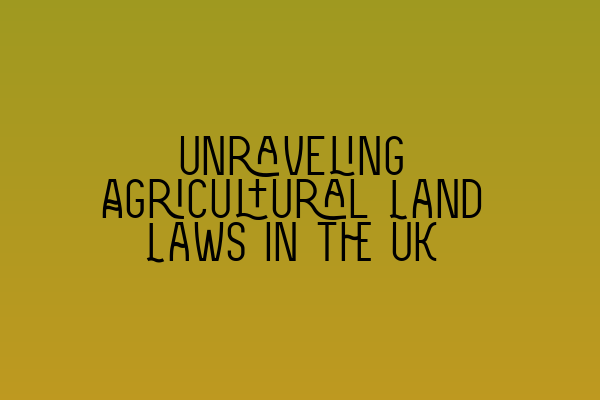Unraveling Agricultural Land Laws in the UK
As a solicitor specializing in property law, it is my duty to keep clients informed and knowledgeable about the intricacies of various legal matters. Today, we will dive into the complex realm of agricultural land laws in the UK. Understanding these laws is crucial for anyone involved in rural property transactions, from farmers and landowners to investors and developers.
Agricultural land laws regulate the use, purchase, and sale of land for agricultural purposes. This encompasses a wide range of issues, from land use planning and environmental regulations to agricultural tenancies and subsidies. Navigating through these laws can be a daunting task, but with the right information and guidance, you can ensure compliance and protect your interests.
Let’s start by exploring the concept of “agricultural land” itself. In the UK, agricultural land is classified as land that is used for farming activities, including the cultivation of crops, rearing of livestock, or any other agricultural-related activity. It is important to note that this includes not only the physical land but also any buildings or structures directly related to farming.
One of the key aspects of agricultural land laws is land use planning. Local authorities have the power to determine how land can be used and developed within their jurisdiction. They rely on land use planning policies and guidelines to assess applications for development and ensure that agricultural land is protected. These policies aim to strike a balance between preserving agricultural land for future generations and promoting sustainable development.
When it comes to buying or selling agricultural land, parties must be aware of the different types of ownership and tenancy arrangements available. Freehold ownership allows the owner to have complete control and ownership rights over the land. It is the most secure form of ownership but also comes with the responsibility of complying with all relevant laws and regulations.
On the other hand, agricultural tenancies provide a legal framework for farmers to occupy and use agricultural land without owning it outright. The two main types of agricultural tenancies in the UK are Agricultural Holdings Act (AHA) tenancies and Farm Business Tenancies (FBT).
AHA tenancies, governed by the Agricultural Holdings Act 1986, offer long-term security of tenure for tenants. They can only be terminated in specific circumstances, and tenants have the right to compensation for improvements made to the land. However, AHA tenancies can be complex, so it is crucial to seek legal advice to understand the rights and obligations involved.
FBTs, introduced under the Agricultural Tenancies Act 1995, provide more flexibility for landowners and tenants. They allow for shorter-term tenancies of two years or more, with less statutory protection for tenants compared to AHA tenancies. FBTs have become increasingly popular due to their flexibility and simplicity.
Navigating agricultural land laws also involves an understanding of environmental regulations. The UK has various regulations in place to protect the environment and promote sustainable farming practices, including the Basic Payment Scheme (BPS) and cross-compliance requirements. The BPS provides subsidies to farmers who meet certain eligibility criteria, while cross-compliance requires farmers to adhere to specific environmental and animal welfare standards.
As with any legal matter, it is essential to seek professional advice when dealing with agricultural land transactions. A solicitor with expertise in property law can guide you through the complexities of agricultural land laws, ensuring that your rights are protected and transactions are conducted in accordance with legal requirements.
To enhance your understanding of related legal topics, I invite you to explore the following articles:
1. Understanding Contractual Capacity: Rights and Limitations – Gain insights into the legal principles that determine an individual’s capacity to enter into a contract.
2. Interactive SQE Mock Tests for Contract Law: Test Your Knowledge – Test your knowledge of contract law concepts with our interactive mock tests, designed to prepare you for your SQE exams.
3. Join Our SQE Contract Law Webinars: Expert Insights and Guidance – Participate in our webinars conducted by legal experts to gain invaluable insights and guidance on contract law topics.
4. Contract Law Reforms: An Analysis of Recent Changes – Stay up to date with the latest developments in contract law through our in-depth analysis of recent reforms.
5. Parties in a Contract: Rights and Responsibilities – Understand the rights and responsibilities of parties involved in a contract, ensuring clarity and fairness in contractual relationships.
At SQE Property Law & Land Law, we are committed to providing comprehensive legal services and expert advice on agricultural land laws and other property-related matters. Our team of solicitors is well-versed in the intricacies of property law and can assist you in navigating the complex landscape of agricultural land transactions. Contact us today to discuss your property law needs and ensure the protection of your interests.
